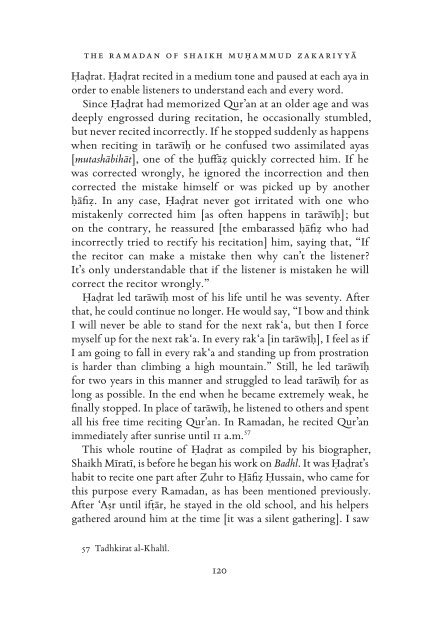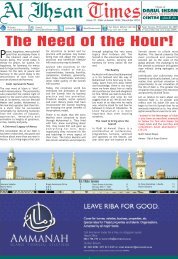TheRamadan of Shaykh Al-Hadith Ml ZakariyyaKandelwi by Dr Muhammad Ismail Memon Madani
TheRamadan of Shaykh Al-Hadith Ml ZakariyyaKandelwi by Dr Muhammad Ismail Memon Madani
TheRamadan of Shaykh Al-Hadith Ml ZakariyyaKandelwi by Dr Muhammad Ismail Memon Madani
You also want an ePaper? Increase the reach of your titles
YUMPU automatically turns print PDFs into web optimized ePapers that Google loves.
the ramadan <strong>of</strong> shaikh muĤ ammud zakariyyĀ<br />
Ĥađrat. Ĥađrat recited in a medium tone and paused at each aya in<br />
order to enable listeners to understand each and every word.<br />
Since Ĥađrat had memorized Qur’an at an older age and was<br />
deeply engrossed during recitation, he occasionally stumbled,<br />
but never recited incorrectly. If he stopped suddenly as happens<br />
when reciting in tarāwīĥ or he confused two assimilated ayas<br />
[mutashābihāt], one <strong>of</strong> the ĥuffāż quickly corrected him. If he<br />
was corrected wrongly, he ignored the incorrection and then<br />
corrected the mistake himself or was picked up <strong>by</strong> another<br />
ĥāfiż. In any case, Ĥađrat never got irritated with one who<br />
mistakenly corrected him [as <strong>of</strong>ten happens in tarāwīĥ]; but<br />
on the contrary, he reassured [the embarassed ĥāfiż who had<br />
incorrectly tried to rectify his recitation] him, saying that, “If<br />
the recitor can make a mistake then why can’t the listener?<br />
It’s only understandable that if the listener is mistaken he will<br />
correct the recitor wrongly.”<br />
Ĥađrat led tarāwīĥ most <strong>of</strong> his life until he was seventy. After<br />
that, he could continue no longer. He would say, “I bow and think<br />
I will never be able to stand for the next rak‘a, but then I force<br />
myself up for the next rak‘a. In every rak‘a [in tarāwīĥ], I feel as if<br />
I am going to fall in every rak‘a and standing up from prostration<br />
is harder than climbing a high mountain.” Still, he led tarāwīĥ<br />
for two years in this manner and struggled to lead tarāwīĥ for as<br />
long as possible. In the end when he became extremely weak, he<br />
finally stopped. In place <strong>of</strong> tarāwīĥ, he listened to others and spent<br />
all his free time reciting Qur’an. In Ramadan, he recited Qur’an<br />
immediately after sunrise until 11 a.m. 57<br />
This whole routine <strong>of</strong> Ĥađrat as compiled <strong>by</strong> his biographer,<br />
Shaikh Mīratī, is before he began his work on Badhl. It was Ĥađrat’s<br />
habit to recite one part after Żuhr to Ĥāfiż Ĥussain, who came for<br />
this purpose every Ramadan, as has been mentioned previously.<br />
After ‘Aśr until ifţār, he stayed in the old school, and his helpers<br />
gathered around him at the time [it was a silent gathering]. I saw<br />
57 Tadhkirat al-Khalīl.<br />
120



